WHO’s work with Syrian refugees inside Turkey

WHO/Ali Saltan
Turkey has provided shelter to about two thirds of the more than 5.5 million Syrians who have fled their homeland since the beginning of the conflict, making it the country with the highest number of refugees in the world. Throughout this period, WHO has worked closely with the Ministry of Health to provide a full range of services to Syrian refugees with similar standards as those for Turkish citizens.
The Refugee Health Programme is a flagship model of health response and provision of universal health coverage. Not only do Syrian people receive culturally-sensitive, affordable and quality health services, but Syrian doctors, nurses and midwives in Turkey have the opportunity to start a new life and career in a new country, helping their people while practicing their professions.
The opportunity for a new career follows a 7-week adaptation training programme developed by WHO in collaboration with the Turkish Ministry of Health, including a 6-week practical training course under the supervision of Turkish doctors and nurses in refugee health training centres.
Since the beginning of the Refugee Health Programme in 2016, about 2000 Syrian doctors, nurses and midwives have been trained in the seven refugee health training centres, and over half of these doctors, nurses and midwives have been hired by the Turkish Ministry of Health to provide health services for Syrian refugees. Over 1 000 consultations were provided to Syrian patients in 2017–18, and over 75% of Syrian children under 1 year of age were vaccinated. Through this initiative, refugees who are patients are addressed in their own language, in a culturally sensitive manner.
From its Country Office in Turkey, WHO:
- supports seven refugee health training centres, where Syrian doctors and nurses receive on-the-job training while providing health services for Syrian patients;
- supports 178 health centres;
- trains Arabic-Turkish language interpreters to serve as patient guides at primary, secondary and tertiary levels of care;
- provides continuing medical education to Turkish and Syrian health staff in diagnosing and treating mental health conditions such as depression, anxiety and post-traumatic disorders;
- supports government vaccination campaigns for refugee children;
- trains and employs Syrian community health support staff to provide home care to the Syrian elderly and disabled.



